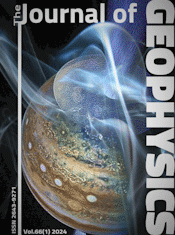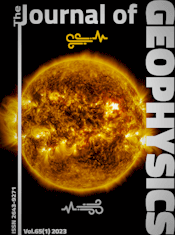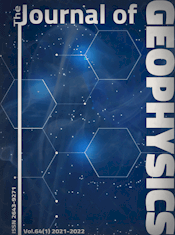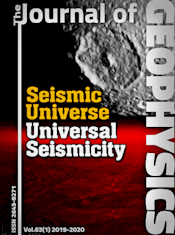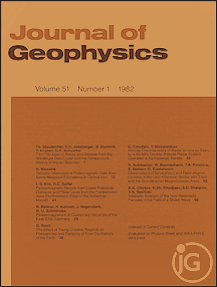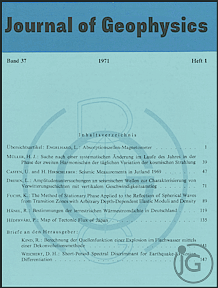A model of electrical resistivity beneath NE-Iceland, correlation with temperature
Article Sidebar
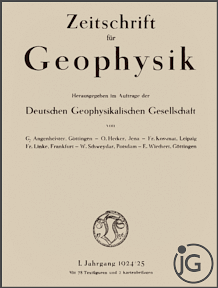
Vols. 1-18 (1924-1944), ISSN 0044-2801
Main Article Content
Abstract
Short period magnetotelluric measurements (15 s–1 h) were made at 19 sites in NE-Iceland, distributed over the neovolcanic zone and the adjoining older Tertiary flood basalt areas. With model-calculations of one- and two-dimensional resistivity distributions a characteristic model was found for the lower crust and upper mantle. Beneath a thin surface layer the resistivity is 100 Ωm except within the active neovolcanic zone where it is 50 Ωm. This layer extends to a layer with low resistivity of 15 Ωm. The low-resistivity layer is about 5 km thick. The depth of its upper boundary increases from 10 km to about 20 km with increasing distance from the rift axis. The resistivity beneath the low-resistivity layer is about 100 Ωm down to at least 100 km. Comparison of field data with laboratory measurements on conductivity at high temperatures indicates that the low-resistivity layer consists of partially molten basalt at a temperature of 1,000° –1,100° C. The underlying layer very probably consists of partially molten ultramafic rocks and is presumably the uppermost part of the mantle beneath Iceland. The basaltic low-resistivity layer is interpreted as the base of the crust formed by upward movement of the basaltic melt fraction from the mantle.
 ARK: https://n2t.net/ark:/88439/y021104
ARK: https://n2t.net/ark:/88439/y021104
Permalink: https://geophysicsjournal.com/article/77
Article Details
References
Beblo, M., Bjornsson, A. (1978) Magnetotelluric investigation of the lower crust and upper mantle beneath Iceland. J. Geophys. 45:1-16
Bjornsson, A. (1976) Electrical resistivity of layer 3 in the Icelandic crust. In· V Greinar ed. pp. 7-23. Reykjavik Societas Scientiarum Islandica
Bottinga, Y., Allegre, C. (1976) Geophysical, petrological and geochemical models of the oceanic lithosphere. Tectonophysics 32:9-59
Duba, A. (1976) Are laboratory electrical conductivity data relevant to the Earth? Acta Geodaet. Geophys. Montanist. Acad. Sci. Hung. 11:485-495
Francis, T.J.G. (1969) Upper mantle structure along the axis of the Mid-Atlantic Ridge near Iceland. Geophys. J. R. Astron. Soc. 17:507-520
Haak, V. (1972) Magnetotelluric method - The determination of transfer functions in areas with lateral variation of electrical conductivity. J. Geophys. 38:85-102
Haak, V. (1978) Interpretations - Verfahren fur die Magnetotellurik unter besonderer Berucksichtigung lateral variierender elektrischer Leitfahigkeit im Erdinnern und eines raumlich inhomogenen
induzierenden Magnetfeldes. Bayerische Akademie der Wissenschaften, Munchen
Haak, V. (1979) Relations between electrical conductivity and petrological parameters of the crust and upper mantle. J. Geomagn. Geoelectr. In press.
Hermance, J.F., Grillot, L.R. (1974) Constraints on temperature beneath Iceland from magnetotelluric data. Phys. Earth Planet. Inter 8:1-12
Kemmerle, K. (1977) Magnetotellurik am Alpen-Nordrand mit Diskussion der lokalen Effekte und Darstellung einer Einzeleffekt-Auswertung. Universitet Munchen, Diss. Fak. Geowiss.
RRISP-Working Group (1979) First results from the Reykjanes Ridge Iceland Seismic Project 1977. Nature 279:56-60
Saemundsson, K. (1974) Evolution of the axial rifting zone in northern Iceland and the Tjornes fracture zone. Bull. Geol. Soc. Am. 85:495-504
Schmucker, U. (1974) Erdmagnetische Tiefensondierung mit langperiodischen Variationen. In: Protokoll DFG-Kolloquium Erdmagn. Tiefensond., A. Berktold, Ed., pp. 313-342. Grafrath-Munchen
Shankland, T.J., Waff, H.S. (1977) Partial melting and electrical conductivity anomalies in the upper mantle. J. Geophys. Res. 82:5409-5417
Tryggvason, E. (1961) Arrival times of P-waves and upper mantle structure. Bull. Seismol. Soc. Am. 54:727-736
Waff, H.S. (1974) Theoretical considerations of electrical conductivity in partially molten mantle and implications for geothermometry. J. Geophys. Res. 79:4003-4010



